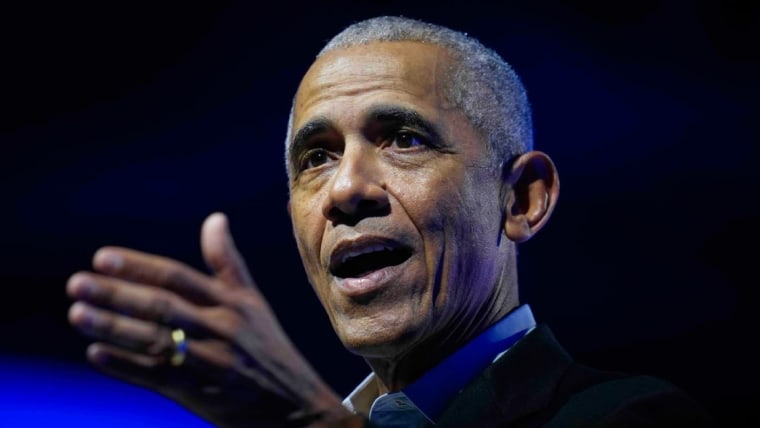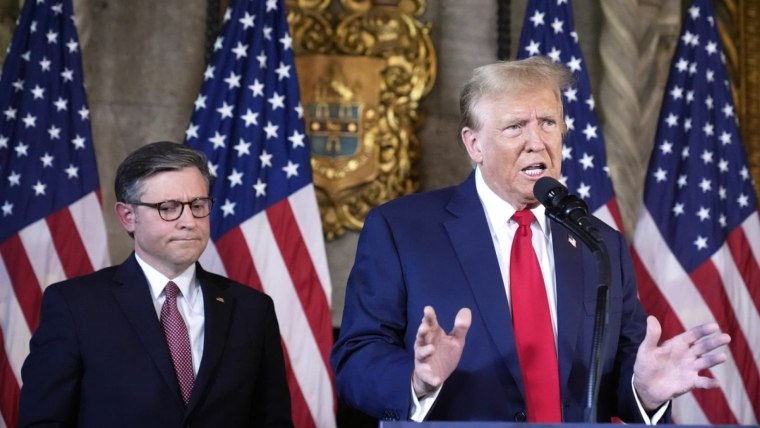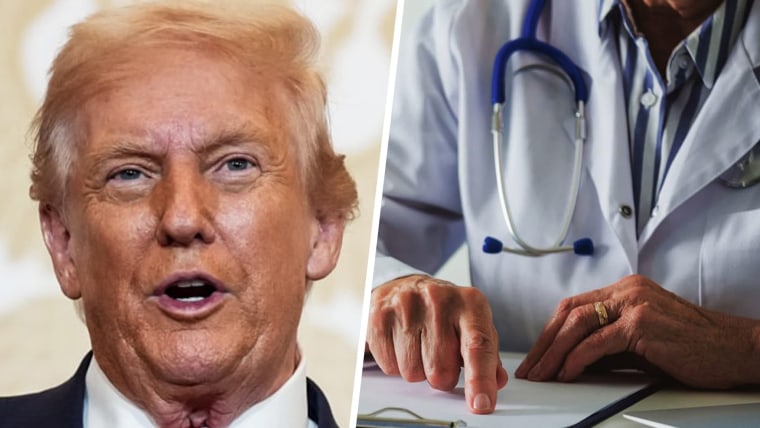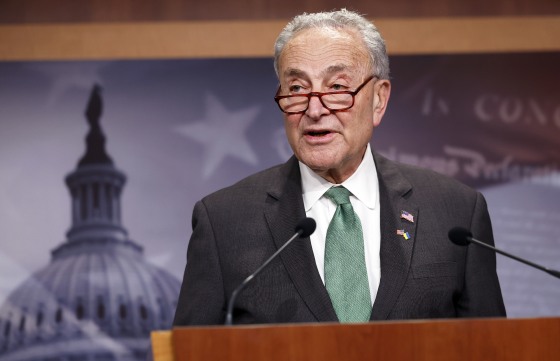Regardless of how the shutdown ends, Democrats have accomplished one major political goal: placing health care top of mind for this election and potentially the next.
Democrats have staked the shutdown fight on combating rising health care costs, demanding that Republicans work with them to extend Affordable Care Act tax credits that are set to expire at the end of the year. And as interested as Democrats are in solving the problem of rising Obamacare premiums, they know there’s a political benefit to this issue hanging over everyone’s head.
“Health care is our ‘dance with the one that brought ya’ issue,” one House Democrat, granted anonymity to discuss the party’s strategy, told MSNBC. “We are trusted on it and we’ve won on it. We are wise to make it our issue for the midterms.”

Another senior Democrat, Rep. Gregory Meeks of New York, emphasized that health care is an issue that touches everyone’s life — saying the cost will “absolutely” still resonate with voters heading into next year.
“Independents, Democrats, moderate Republicans — this affects all of them,” Meeks told MSNBC. “Everybody sees these rates going up.”
Meanwhile, Republicans have argued that the Obamacare subsidies are an issue that can be discussed down the road — after the government is reopened — since the expiration date isn’t until the end of December. But that position falls into a potential political trap, with Obamacare enrollees now getting a glimpse of their dramatically increased rates, and seeing just one party actively engaged in trying to lower the premiums.
No matter how the shutdown ends, the off-ramp will likely ensure that health care is a live issue for the 2026 midterm elections. Even if Democrats succeed in extending most of the subsidies — something that is certainly not a given — those subsidies will likely be temporary, and premiums will almost certainly still go up for most enrollees.
In other words: Even when the issue is settled, it’s unlikely to be settled.
Consider some of the potential solutions lawmakers are discussing. One possibility Democrats have put forward is a simple, one-year extension of the existing credits. That would place the Obamacare fight front and center for 2026, with President Donald Trump repeatedly on the record pushing Republicans to replace the 2010 health care law with something else — and with both parties keenly aware of the electoral results the last time the GOP tried to repeal and replace the Affordable Care Act.
Millions of people are seeing their health care costs more than double because of Republicans. Their obsession with gutting Americans’ health care is going to cost them the House Majority.”
Viet Shelton, spokesman for the Democratic Congressional Campaign Committee
Another possibility is a scaled-down version of the Obamacare tax credits, with Republicans like Senate Majority Leader John Thune of South Dakota publicly floating income caps. But even that legislative remedy would have real-world and political consequences, as fewer people would likely sign up for Obamacare and premiums would still rise for most enrollees.
In both scenarios, health care will be a very public debate — and a point of pain — for the rest of the year, and potentially for the rest of this congressional term.
“I’ll leave the politics to others,” Sen. Josh Hawley, R-Mo., told MSNBC, “but I can tell you what’s just a problem for people is if their health care premium is double, because they’re already too expensive.”
Polling has historically demonstrated that Democrats have a sizable advantage on health care, with surveys showing voters trust them more than Republicans on the issue.
A 2023 KFF tracking poll showed Democrats with a 20-point advantage on the question of who voters trust to handle health care affordability and the future of Obamacare.
And in Gallup polls stretching back to the 1990s, voters routinely pick Democratic presidential candidates over Republicans on the question of who’d better handle health care, often by double-digit margins.

Democrats, who were already poised to make overall affordability a central tenet of their midterm message, are aware that they have the upper hand on health care. And in competitive congressional districts, Democrats are already embracing health care as a top issue, telling MSNBC there is real concern from their constituents.
Rep. Tom Suozzi, D-N.Y., who is one of 13 Democrats representing a district that Trump won in 2024, told MSNBC that people list health care as “one of the biggest concerns.”
“And they list affordability as being their No. 1 biggest concern,” Suozzi said.
But unlike affordability, Democrats actually have an advantage on the health care issue, and they could use that debate to make inroads on those other economic messages.
For instance, Republicans have repeatedly said they “strengthened” Medicaid through their reconciliation bill, after cutting $1.1 trillion in funding from the program over the next decade.
Democrats could turn the GOP’s words against them, arguing to voters that when they say they’re making health care better — or improving inflation, or aiding the economy — the data doesn’t back up their claims; just look at what Republicans said about “strengthening” Medicaid.
Democrats need to net just a few seats this cycle to win control of the House, which would allow them to place a major check on the Trump administration.
“Millions of people are seeing their health care costs more than double because of Republicans,” Viet Shelton, a spokesman for the Democratic Congressional Campaign Committee, said in a statement. “Their obsession with gutting Americans’ health care is going to cost them the House majority.”
A handful of Republicans recognize that health care is a major messaging problem for their party. Sen. Shelley Moore Capito, R-W.Va., for example, told MSNBC it’s a “tough political issue all the time, and usually Republicans end up on the downside of that issue.”

Still, many Republicans think it’s no fait accompli that Democrats will always perform better on the issue — with some Republicans arguing in interviews with MSNBC that the subsidies at the heart of the shutdown debate demonstrate that Obamacare isn’t working.
Asked whether she thinks Republicans can flip the historical trend on health care, Capito was hopeful.
“I think we can,” she said.
Sen. Thom Tillis, R-N.C., a retiring Republican known as a bipartisan dealmaker on Capitol Hill, suggested a “businesslike approach” to health care, arguing that if Republicans are sensitive to how they reform health care, the party will “be fine.”
“If on the other hand we take this dogmatic approach and say cancel it, I don’t think we’ll be fine,” Tillis added.
A Republican strategist close to House campaigns told MSNBC that a victory for the GOP may be more marginal. “If Republicans can break even on health care in the public eye, that’s a win,” the strategist said.
Johnson said he’s got ideas and pages of policy ideas and committees of jurisdiction are working on it, but he refused to give one policy proposal to our GOP conference on our own conference call.”
Rep. Marjorie Taylor Greene, R-Ga.
Other Republicans reject the idea that health care will be the dominant topic in the 2026 midterms, contending that voters will still be focused on the economy and public safety, while also being delighted by the tax cuts they see from the GOP’s reconciliation bill.
“I don’t think it’s going to be dominated by health care,” Sen. Lindsey Graham, R-S.C., said. “It’s going to be dominated by what party is making you safe and prosperous.”
Asked how Republicans are preparing to message on health care for the midterms, the House GOP’s campaign arm pointed to affordability.
“Republicans are fighting for quality, affordable healthcare by expanding access, lowering costs, and protecting care for seniors and families,” National Republican Congressional Committee spokesperson Mike Marinella said in a statement.
Despite the confidence, there are signs that Republicans are aware of their potential vulnerability over health care. For starters, a recent flare-up between Speaker Mike Johnson, R-La., and Rep. Marjorie Taylor Greene, R-Ga., showed how the politics of health care aren’t falling along neat partisan lines.
Last week, when Johnson insisted that Republicans have long been working on a “fix” for health care, Greene took to social media to voice her frustration.
“Johnson said he’s got ideas and pages of policy ideas and committees of jurisdiction are working on it, but he refused to give one policy proposal to our GOP conference on our own conference call,” Greene wrote.
For another thing, vulnerable Republicans are drawing distinctions between themselves and the rest of their party on health care. Rep. Mike Lawler, R-N.Y., one of three House Republicans representing a district Kamala Harris won in 2024, told MSNBC he is “leaning in on” health care, noting he’s a co-sponsor of a bipartisan bill to extend the Obamacare tax credits for one year.
The Republican strategist with ties to House races told MSNBC that, unlike 2022 and 2024 — when GOP lawmakers tried to avoid the topic of abortion following the Dobbs v. Jackson Women’s Health Organization decision — candidates are rushing full steam ahead.
“This is not like when Republicans tried ignoring abortion after the Dobbs decision,” the strategist said. “There’s always more work to be done, but they’ve done a great job pushing back, being aggressive and sharing stories of those positively impacted by their agenda.”
But Democrats don’t think health care is an issue Republicans can so easily turn into a political strength.
As Meeks said, Republicans keep saying they have a plan to address health care.
“They’ve been saying that since the first Trump administration,” Meeks said. “They have not come up with anything yet.”
